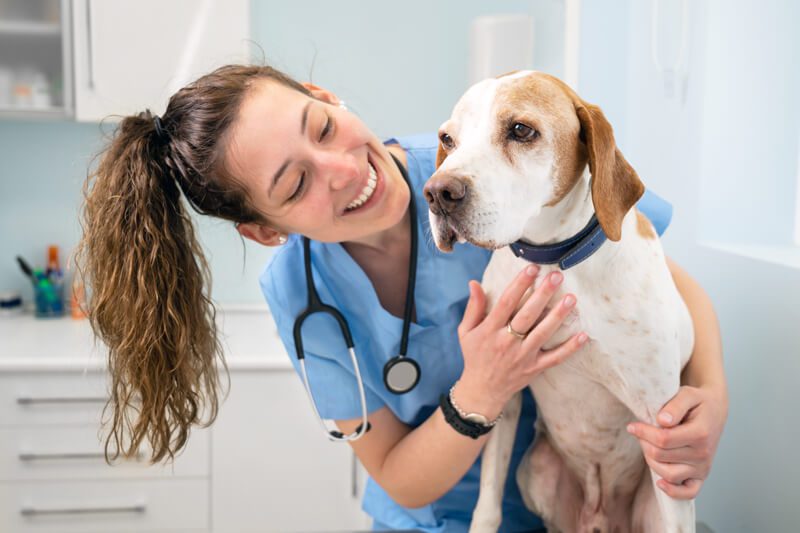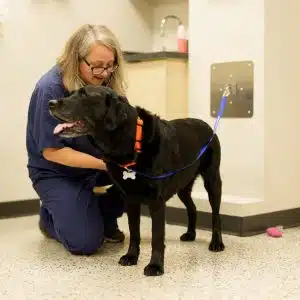What to expect ahead of your pet’s Pet Cancer Surgery
Wiki Article
Comprehensive Guide to the Solutions Supplied by a Veterinary Oncologist
Veterinary oncology includes a broad selection of solutions aimed at dealing with and detecting cancer in animals. Veterinary Cancer Specialist. Oncologists employ innovative diagnostic strategies and provide numerous treatment alternatives tailored per animal's requirements. They also prioritize encouraging care and offer important resources for pet dog owners. Recognizing these services is crucial for making informed choices. What details elements of vet oncology can notably affect a pet dog's treatment journey?Understanding Veterinary Oncology
Vet oncology is a customized field concentrated on treating and detecting cancer in animals. This discipline includes a vast array of methods, from medical therapies such as chemotherapy and immunotherapy to medical treatments aimed at eliminating tumors. Vet oncologists are trained to identify the unique manifestations of cancer in different types, allowing them to customize treatment strategies to specific people.In addition to typical therapies, veterinary oncology emphasizes helpful treatment, which plays a crucial duty in boosting the quality of life for afflicted pets. This includes pain monitoring, dietary support, and palliative care choices. Collaboration with family pet proprietors is crucial, as they are essential to decision-making concerning their pet dogs' therapy courses. As research breakthroughs, veterinary oncology proceeds to advance, using new hope and enhanced end results for pets diagnosed with cancer cells. Generally, this field is fundamental for attending to the intricacies of cancer in friend pets.
Advanced Diagnostic Techniques
Advanced diagnostic methods play a crucial duty in veterinary oncology, providing essential understandings into the visibility and level of cancer cells in animals. Imaging techniques such as ultrasound, CT scans, and MRI are frequently utilized to imagine growths and analyze their qualities. Furthermore, biopsy procedures are essential for obtaining cells examples, permitting clear-cut medical diagnosis and customized treatment strategies.Imaging Modalities Utilized
Imaging modalities play a necessary role in the diagnosis and management of cancer in pets. Vet oncologists use different advanced imaging techniques to assess growth metastasis, dimension, and existence. Radiography, or X-rays, uses an initial sight of bone and chest problems, while ultrasound offers real-time imaging of soft tissues, allowing for in-depth assessment of interior body organs. Computed tomography (CT) boosts visualization of complex anatomical structures and makes it possible for 3D reconstructions, helping in specific tumor localization. Magnetic vibration imaging (MRI) is invaluable for soft cells differentiation, especially in brain growths. Furthermore, nuclear medicine methods such as positron exhaust tomography (ANIMAL) aid recognize metabolic task within growths. Collectively, these modalities improve diagnostic precision, assisting reliable therapy techniques for oncological individuals.Biopsy Procedures Described
Complying with the preliminary assessment through imaging techniques, getting a definitive medical diagnosis typically calls for cells tasting with biopsy treatments. Vet oncologists utilize various biopsy techniques based on the tumor's place and features. Great needle ambition (FNA) is a minimally intrusive technique that draws out cells for cytological examination, ideal for surface masses. Core needle biopsies offer bigger tissue samples and work for much deeper tumors, permitting histopathological evaluation. Surgical biopsies involve excising a section or the entire lump, promoting comprehensive examination. These treatments not just verify the visibility of cancer cells yet additionally aid determine its kind and quality, directing treatment choices. Each biopsy technique is chosen very carefully to balance diagnostic precision with patient security and convenience.Therapy Choices for Cancer in Family pets
When a family pet is diagnosed with cancer, a selection of therapy options appear to aid manage the disease and boost top quality of life. Veterinary oncologists commonly advise a multidisciplinary method tailored to the specific pet dog's demands, which may consist of surgical procedure, radiation treatment, immunotherapy, or alternative therapies.Surgery is usually employed to eliminate tumors and afflicted cells, potentially bring about full remission sometimes. Radiation therapy aims to destroy and target cancer cells, reducing lump dimension and minimizing signs - Veterinary Oncologist. Immunotherapy harnesses the pet dog's body immune system to combat cancer much more effectively, while alternate treatments could consist of acupuncture or natural supplements to sustain general health
Each therapy choice brings its very own benefits and risks, and veterinary oncologists function very closely with pet proprietors to make a detailed plan that lines up with the pet dog's particular diagnosis and the proprietor's dreams. The utmost goal is to boost the animal's convenience and high quality of life throughout their cancer trip.
Radiation treatment for Pets
Chemotherapy is a typical therapy choice for pets detected with cancer and is commonly made use of together with various other therapies outlined by veterinary oncologists. This treatment includes the administration of particular medications designed to target and destroy cancer cells, thereby decreasing growth dimension and preventing the spread of the illness. Veterinary oncologists tailor radiation treatment protocols based on the kind of cancer cells, the animal's general health and wellness, and the desired treatment result.Side results can occur, as these drugs may also affect healthy cells. Common responses include queasiness, vomiting, and short-term changes in cravings - Board Certified Veterinary Oncologist. Vet oncologists are furnished to handle these adverse effects properly, ensuring the animal's comfort throughout the therapy process. Normal surveillance through blood examinations and follow-up consultations is important to analyze the animal's reaction to chemotherapy and make essential modifications. Inevitably, chemotherapy can supply significant advantages, enhancing the lifestyle for pet dogs encountering cancer cells diagnoses

Radiation Treatment in Vet Medication
Radiation treatment offers as a reliable therapy option for pet dogs diagnosed with localized growths, offering a targeted method to cancer cells monitoring. This method uses high-energy radiation to damage the DNA of cancer cells, preventing their capacity to proliferate. It is especially beneficial for tumors that are not amenable to surgical elimination or for situations where surgical treatment might not be viable due to the lump's location.Veterinary oncologists tailor radiation protocols based upon growth kind, area, and dimension, as well as the pet dog's overall health. Treatment can be supplied by means of external beam of light radiation or brachytherapy, each with distinctive benefits. Generally, several sessions are needed to make best use of effectiveness while decreasing side effects.
Although animals might experience momentary responses such as skin irritation, the overall goal is to shrink growths and reduce symptoms, eventually boosting the animal's diagnosis and lifestyle. As necessary, radiation treatment plays a vital role in comprehensive cancer cells care.
Palliative Care and Top Quality of Life
Palliative treatment in veterinary oncology concentrates on enhancing the lifestyle for pets facing terminal ailments, making sure convenience and self-respect in their final days. This specialized strategy focuses on discomfort management, signs and symptom control, and emotional support. Veterinary oncologists examine each pet dog's individual requirements, tailoring interventions to ease pain and boost total wellness.Strategies might consist reference of administering drugs for discomfort alleviation, taking care of nausea or vomiting, and addressing other distressing signs and symptoms. Additionally, nutritional assistance is often given to maintain stamina and boost cravings. The emotional aspect of palliative treatment is equally essential; producing a calm environment helps minimize stress and anxiety for both family pet and proprietor.
Inevitably, the objective of palliative care is to enable animals to appreciate their staying time with as much pleasure and self-respect as feasible. By focusing on convenience and lifestyle, vet oncologists play a necessary duty in guaranteeing that animals and their households browse this difficult journey with compassion and understanding.
Assistance for Animal Owners During Treatment

Psychological Support for Owners
Charting the psychological landscape throughout a pet's cancer therapy can be a frustrating experience for owners. The unpredictability surrounding medical diagnosis and prognosis can lead to feelings of despair, vulnerability, and anxiety. Vet oncologists acknowledge the relevance of psychological assistance and usually give support to aid owners navigate this difficult trip. Interaction is vital; going over treatment choices and potential outcomes can alleviate some fears. Furthermore, providing confidence that psychological responses stand fosters a supportive atmosphere. Lots of oncology clinics may also suggest support system or counseling services tailored for family pet owners, helping with shared experiences. Urging proprietors to focus on self-care during this time around is vital, as their emotional well-being directly affects their family pet's convenience and total therapy experience.
Resources and Educational Products
Guiding through the intricacies of a pet dog's cancer cells therapy can be frightening for proprietors, making accessibility to trusted sources and instructional products vital. Veterinary oncologists often provide a range of handouts, brochures, and online products that describe treatment options, possible negative effects, and care approaches. These resources assist debunk the procedure and encourage family pet owners to make educated decisions. Additionally, numerous oncology centers use accessibility to sustain discussion forums and teams where owners can attach with others facing comparable obstacles, promoting a sense of community. Educational workshops and webinars conducted by vet specialists even more boost understanding, ensuring that proprietors are well-equipped to navigate their pet dog's trip with cancer therapy with self-confidence and understanding.Frequently Asked Concerns
Just How Can I Prepare My Animal for a Vet Oncology Go To?
Preparing an animal for a veterinary oncology browse through includes celebration medical records, keeping in mind symptoms, and click here for more making certain the pet dog is comfortable. A tranquil disposition and familiar products can assist ease anxiety throughout the consultation.What Are the Indications My Family Pet May Have Cancer?
Signs that a family pet might have cancer include unexplained weight management, persistent vomiting or diarrhea, uncommon swellings or swellings, lethargy, adjustments in cravings, problem breathing, and changes in behavior. Motivate vet interest is essential.Exactly How Can I Support My Pet Dog Psychologically During Therapy?
Supporting an animal mentally throughout treatment involves supplying comfort, maintaining regimens, offering mild love, and making sure a tranquil atmosphere. Engaging in quiet play and normal friendship helps minimize stress and promotes a sense of safety.Are There Alternative Treatments for Animals With Cancer cells?
Alternate treatments for family pets with cancer include acupuncture, natural treatments, and nutritional support. These strategies may enhance traditional therapies, advertising general wellness. Consulting with a vet is crucial for efficient and safe integration of alternative therapies.What Prices Should I Expect for Veterinary Oncology Solutions?
The awaited costs for veterinary oncology solutions can vary considerably, commonly influenced by diagnostics, treatments, and ongoing care. Pet dog proprietors ought to plan for expenditures ranging from assessments to specialized therapies, mirroring the intricacy of cancer administration.Partnership with pet dog proprietors is critical, as they are important to decision-making regarding their pets' therapy courses. Each therapy option brings its own advantages and risks, and veterinary oncologists function very closely with family pet owners to design an extensive plan that aligns with the animal's specific medical diagnosis and the proprietor's wishes. Pet dogs may experience short-term responses such as skin irritation, the total goal is to shrink tumors and reduce signs, ultimately improving the animal's diagnosis and high quality of life. Support for pet dog owners during treatment is crucial in steering through the emotional difficulties linked with a family pet's cancer medical Check This Out diagnosis. Preparing a pet for a vet oncology check out includes event medical documents, keeping in mind signs, and making certain the animal is comfy.
Report this wiki page